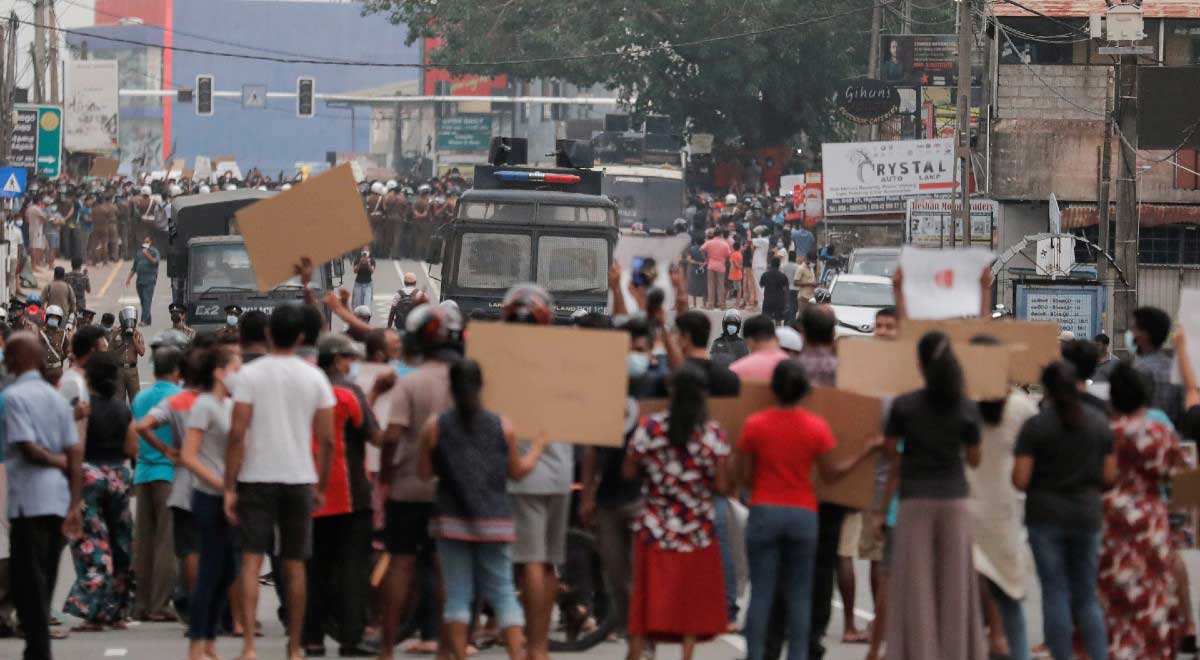Sri Lankan President Gotabaya Rajapaksa sacked his brother as finance minister on Monday after he dissolved the government and called for a unity administration as protests over the country’s economic crisis focused on the role of the ruling family.
The debt-ridden country, run by Rajapaksa and several members of his family since 2019, is struggling to pay for fuel and other imported goods due to a lack of foreign exchange, leading to hours-long power outages and shortages of essentials.
Police used tear gas to disperse hundreds of demonstrators who had gathered outside the private residence of Prime Minister Mahinda Rajapaksa in Tangalle, southern Sri Lanka. Mahinda, the president’s older brother, was in the capital of Colombo at the time.
Intense protests
“The protesters broke through two barricades set up near the house, and the police had to use tear gas to disperse them,” police spokesman Nihal Thalduwa said. After many protesters called for the complete elimination of the Rajapaks, the Presidential Information Office said in a statement that four new ministers had been appointed “so that parliament and other tasks can be legitimately carried out until the entire cabinet is sworn in.”
The president’s nephew stepped down as sports minister in a dissolved government, and the president of the Central Bank offered to step down. The central bank has postponed the announcement of a monetary policy statement scheduled for Tuesday. Attorney General Ali Sabra has been named Treasury Secretary to replace Basil Rajapaksa, who was due to travel to Washington earlier this month to negotiate with the International Monetary Fund (IMF) on a loan program, the press office said.
The Ministers of Foreign Affairs, Education and Highways will retain their posts. “The President invites all political parties represented in Parliament to jointly accept ministerial portfolios in order to find a way out of this national crisis,” the press service said.
Udaya Gammanpila, head of one of the ruling coalition’s 11 political parties, called the new cabinet “old wine in a new bottle.” “We demand the formation of an interim government of all parties that will restore basic services and hold parliamentary elections,” Gammanpila of Pivituru Hel Urumaya tweeted. “People should choose their next leaders, not someone else.”
“Gotabaya must go”
The move follows the president’s declaration of a state of emergency on Friday over street protests in the island nation of 22 million. The energy regulator said daily power outages would be reduced to 1.5 hours through the end of the week from the current seven hours after the Energy Department pledged to supply 26,000 tons of diesel and fuel oil to several power plants.
Protester Chamara Nakandala said the government changes were a temporary attempt to appease the public.
“The government changes are trying to fool people,” said Nakandala, a marketing specialist, during a protest in Colombo. – This row is finished. Rajapaksa can no longer save him.
Markets are sinking Sri Lanka
Sri Lankan dollar bonds fell more than 5 cents against the dollar in early trading before recovering from some losses, with many of them trading very low around 45 cents, not far from their record lows in early March, according to Tradeweb.
The country on India’s southern tip is also struggling with rising inflation after the government sharply devalued its currency last month ahead of talks with the IMF. During the rule of successive states, Sri Lanka’s expenditure exceeded its income, and the production of trade goods and services was insufficient. The double deficit has been hit hard by the COVID-19 pandemic, which has crippled tourism, which is the backbone of the economy.
JP Morgan’s Toshi Jane has estimated Sri Lanka’s gross debt service at $7 billion this year, with a current account deficit of about $3 billion.
“In the absence of significant foreign exchange inflows, meeting such a large external demand is proving very difficult, leading to a reduction in foreign exchange reserves and requiring strict import controls,” Jain said.

